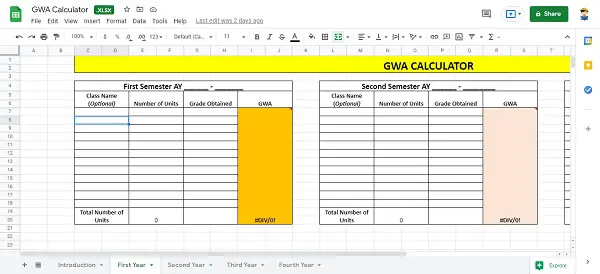FREE GWA Calculator: How To Compute Your General Weighted Average

Whether you are applying for admission into a university or qualifying for a scholarship grant or a graduate study, GWA (General Weighted Average) is always part of the qualification process.
However, not every institution provides a comprehensive presentation of your GWA, and you need to work with the calculation to derive it. Let this article guide you on how to compute GWA in the Philippines.
Table of Contents
Simple Online GWA Calculator (Free)
Do you want a quick way to compute your GWA? We’ve got you covered!
This free online GWA calculator lets you input all the classes or subjects you’ve completed in a particular semester, your grades for each subject, and their corresponding number of units.
Click Compute, and our free GWA calculator will automatically calculate your General Weighted Average—no need to use a bulky calculator or perform multiple steps to obtain your GWA.
Note that the simple GWA calculator below is an original design based on the Excel calculator we created previously. If you prefer an expanded version of this calculator where you can compute your GWA for multiple semesters or school years, please download our other free GWA calculator in Excel format in the next section.
GWA Calculator

This free online calculator is the intellectual property and copyright of Edustone Web Content Publishing (FilipiKnow). You may not copy, reproduce, distribute or publish this calculator without the prior written permission of the owner. This is intended for general information and educational purposes only, and should not be considered as a substitute for professional or legal advice.
Expanded GWA Calculator in Excel (Free)

Do you want an expanded version of the calculator above? No problem!
We’ve also developed a free GWA calculator in Excel that allows you to compute, record, and view your General Weighted Average for each semester and academic year completed.
To compute the GWA for a specific semester, you must enter the required values and get the results immediately.
Click here to download the free Excel GWA calculator and instructions on using it. Please continue reading the article below for a detailed discussion of GWA and its computation.
What Is GWA?
GWA (General Weighted Average) represents your overall academic performance for a semester or an academic year. It is based on the grades you obtained from your classes and the corresponding number of units of each class.
Are GWA and GPA the Same?
GWA and GPA both represent academic performance for a certain period. However, the Grade Point Average (GPA) is based on the “letter-grade” system where each letter has corresponding points (e.g., A = 4 points, B+ = 3 points, and so on) while GWA works with the numerical grades. Some universities abroad, such as the University of Arizona2, use GPA to gauge student’s performance.
Colleges in the Philippines use GWA as a determinant of students’ academic performance. However, there are also universities here that use GPA to determine students’ overall academic performance, such as Far Eastern University3.
How To Compute GWA: A Step-by-Step Guide
You can compute your GWA whether you are a high school student, a college student, or an alumnus applying for a graduate study through this comprehensive guide.
1. How To Compute Your GWA if You Are a High School Student
General Average4 is used for computing the overall academic performance of Junior and Senior High School students since there are no corresponding weights for each subject.
If you are a high school student, you can compute your GWA through these steps:
- Determine your final grades for each subject shown on your report card. The final grade is the average of your grades on a subject for the entire school year.
- Divide the sum of the final grades by the total number of subjects. The resulting number is your General Average for that school year.
2. How To Compute Your GWA if You Are a College Student
As a college student, you may compute your GWA for a particular semester or academic year.
a. Computing Your GWA for a Certain Semester
- Determine the semester in which you want to compute your GWA.
- Determine your grades for each class in that semester.
- Multiply each grade by the respective number of units of that class (e.g., if you have a grade of 1.5 for a particular class of three units of credit, you multiply three by 1.5 and obtain 4.5).
- Add the resulting numbers you have obtained for all classes.
- Lastly, divide the sum you have obtained by the total number of units you have for the entire semester. The resulting number is your GWA for that semester.
b. Computing Your GWA for an Entire Academic Year
- Multiply each grade you have obtained for every subject by their respective number of units.
- Add the resulting numbers you have obtained for all subjects.
- Lastly, divide the sum you have obtained by the total number of units you have taken for the entire academic year. The resulting number is your GWA for that academic year.
3. How To Compute Your GWA if You Are an Alumnus
To compute your GWA, you may look at your Transcript of Records (TOR) or through the online platform that your university used to show your grades for each class.
Here are the following steps to compute your GWA:
- Determine your grades for every class, as your Transcript of Records shows.
- Multiply each grade of your class by the unit credits of that class. For example, if you obtained a 1.50 grade for one of your major classes with a unit credit of 4 units, you have 1.50 x 4 = 6.
- Add the resulting numbers that you have obtained from the previous step.
- Divide the sum you have obtained in step 3 by the total number of units you have acquired during your stay at the university. So, if you took 133 units during your stay at the university, you should divide the sum you have obtained by 133. The resulting number is your GWA.
GWA Computation Guide for Specific Universities
1. University of the Philippines (UP)
If you are from UP, you may compute your GWA using the abovementioned method for college students. Grades from the previous program are included in the computation if you shifted to another program5. Also, grades on classes that are outside of the program’s curriculum are included in the computation.
2. Polytechnic University of the Philippines (PUP)
PUP also uses the GWA system in determining students’ overall academic performance6. If you are from PUP, you may refer to the section “How To Compute Your GWA if You Are a College Student” of this article.
3. Far Eastern University (FEU)
FEU uses Letter Grade with corresponding Quality Points to compute General Point Average. To compute the GPA:
- Determine the Quality Point equivalent for each Letter Grade (e.g., A is 4.0, B+ is 3.5, and so on). You may refer to this site to determine the Quality Point equivalent of each Letter Grade.
- Determine the product of the corresponding Quality Point and the credit units of each subject.
- Add all the products you have obtained.
- Divide the sum by the total number of units you have taken. The resulting number is your GPA.
FEU uses the term QPA (Quality Point Average) most often instead of GPA. Nonetheless, these two terms are just the same.
4. University of Santo Tomas (UST)
As with UP and PUP, the GWA for UST students is computed similarly 7 as stated in the section “How To Compute Your GWA if You Are a College Student” of this article. Also, UST created an app students may use to compute their GWA. You can access it here (Apple) or here (Android).
5. University of the East (UE)
If you are from UE8, you may compute your GWA using the method presented in the “How To Compute Your GWA if You Are a College Student” section of this article. However, according to their website, UE also uses Grade Point Average (GPA) for their retention policy. On the other hand, they use GWA for qualification for Latin honors.
Tips and Warnings
- Some apps can compute your GWA quickly. Examples are GWA Calculator Philippines Ed. and Weighted Average Grades Calculator available in the Google Play store. You can also use spreadsheet templates which can help you determine your GWA.
- Ensure that every value necessary for the computation of GWA (i.e., number of units, weight for each subject, grades per subject) is as accurate as possible to provide a truthful value of your GWA.
- Usually, grades enclosed in a parenthesis that is presented in your records are excluded from the computation of your GWA.
- Some universities publish their students’ GWA every semester on their respective online platforms.
- It is also essential to continuously be updated on possible changes in the grading policy of your university, which might affect how your GWA will be computed.
- There are also other grade averages that universities use for different purposes. For example, UP has Curriculum Weighted Average (CWA), used to determine if a student is qualified for graduation. Take note that these grade averages might be computed differently.
Frequently Asked Questions
1. I obtained a letter mark on some subjects (such as “P” for Pass). How can I compute my GWA?
Computing GWA when there is an involved letter mark depends on the policy of the university or institution, for instance, during the height of ECQ in various places in the Philippines. UP imposed a policy on providing “P” marks during the second semester of that academic year9, which professors may give to their students. The corresponding units of that class with “P” marks are disregarded in the computation of the GWA, and only numerical grades were considered. Nevertheless, GWA for that semester will be excluded from the student’s overall GWA.
2. How can I compute my GWA if I drop a class?
It depends on the university’s policy where you belong, but the classes you have dropped are usually not included in the computation of your GWA. Hence, you should disregard the class you dropped when calculating your GWA.
3. I took some classes twice. How can I compute my GWA?
Determine the average grades you obtained for that class (e.g., if you obtained a 4 in the first semester of that class and a 2 in the second semester of that class: 4 + 2 = 6/2 = 3). The average will be the one that is considered in the computation of your GWA.
4. Is NSTP included in the GWA?
It depends on your school, but most universities (including UP, PUP, and UST) exclude NSTP in the computation of GWA.
5. What is the GWA needed to pass UPCAT, PUPCET, and other entrance exams?
No specific value of GWA stated is required to pass the UPCAT, PUPCET, and other entrance exams. However, most universities consider the grades you have obtained during high school in their qualification process.
6. What is the GWA needed to qualify for Latin honors?
It depends on the policy of your university, but usually, for undergraduate courses, the following grade requirements are followed:
1.0000 – 1.2000 (Summa Cum laude)
1.2001 – 1.4500 (Magna Cum laude)
1.4501 – 1.7500 (Cum laude)
UP, UST, and UE are some schools that follow the above scale.
Meanwhile, PUP uses this scale:
1.0000 – 1. 1500 (Summa Cum laude)
1.1501 – 1.3500 (Magna Cum laude)
1.3501 – 1.6000 (Cum laude)
However, some universities may have different grade requirements to determine whether a student qualifies for Latin honors. You may refer to your university’s handbook or primer to determine the GWA required to be eligible for Latin honors.
7. Will my school include the GWA I obtained during online classes in my overall GWA to determine whether I qualify for honors?
Most universities include the GWA that you obtained during online classes. However, reviewing your university’s policy regarding the grades you have obtained during online classes is still helpful.
8. What GWA should I aim for to shift to another degree program?
Each college or department sets its grade requirements for shifting. You may contact the respective department or refer to their primer regarding shifting.
9. I transferred to another degree program. Will the grades I have incurred in my previous degree program be included in the computation of my GWA?
Yes, the grades you have incurred in your previous degree program will also be included in the computation of your GWA. However, it might not be included for other grade averages, such as CWA, used by some universities like UP.
References
- University of the Philippines Diliman - Office of the University Registrar. (2019). UP System Policy on the Second Semester AY 2019-2020 in the Time of COVID-19 (Supplemental FAQs for UP Diliman) [PDF]. Retrieved from https://our.upd.edu.ph/faqs/ecfaq.pdf
- Grade-Point-Average (GPA) Calculation or Averaging of Grades. Retrieved 12 April 2021, from https://catalog.arizona.edu/policy/grade-point-average-gpa-calculation-or-averaging-grades
- Computation of Grade Point Average (GPA). Retrieved 12 April 2021, from https://www.feu.edu.ph/index.php/registrar-services/computation-of-grade-point-average-gpa/
- Llego, M. (2019). DepEd K to 12 Grading System Steps for Computing Grades. Retrieved 12 April 2021, from https://www.teacherph.com/deped-grading-system/
- University of the Philippines Diliman – Office of the University Registrar. Grade Averages [PDF]. Retrieved from https://our.upd.edu.ph/files/acadinfo/GRADE%20AVERAGES%20.pdf
- PUP Student Handbook. (2019). [Ebook]. Sta. Mesa, Manila, Philippines. Retrieved from https://drive.google.com/file/d/0B1BuDAuN0r8SX1BWX2NSN3FURzg/view
- University of Santo Tomas Student Handbook. (2018). [Ebook]. Retrieved from http://secgen.ust.edu.ph/assets/student-handbook-%E2%80%A2-7-september-2018.pdf
- Students Account Information. Retrieved 12 April 2021, from https://www.ue.edu.ph/manila/main.html?page=students&link=handbook
- University of the Philippines Diliman – Office of the University Registrar. (2019). UP System Policy on the Second Semester AY 2019-2020 in the Time of COVID-19 (Supplemental FAQs for UP Diliman) [PDF]. Retrieved from https://our.upd.edu.ph/faqs/ecfaq.pdf
Written by Jewel Kyle Fabula
Jewel Kyle Fabula
Jewel Kyle Fabula graduated Cum Laude with a degree of Bachelor of Science in Economics from the University of the Philippines Diliman. He is also a nominee for the 2023 Gerardo Sicat Award for Best Undergraduate Thesis in Economics. He is currently a freelance content writer with writing experience related to technology, artificial intelligence, ergonomic products, and education. Kyle loves cats, mathematics, playing video games, and listening to music.
Copyright Notice
All materials contained on this site are protected by the Republic of the Philippines copyright law and may not be reproduced, distributed, transmitted, displayed, published, or broadcast without the prior written permission of filipiknow.net or in the case of third party materials, the owner of that content. You may not alter or remove any trademark, copyright, or other notice from copies of the content. Be warned that we have already reported and helped terminate several websites and YouTube channels for blatantly stealing our content. If you wish to use filipiknow.net content for commercial purposes, such as for content syndication, etc., please contact us at legal(at)filipiknow(dot)net